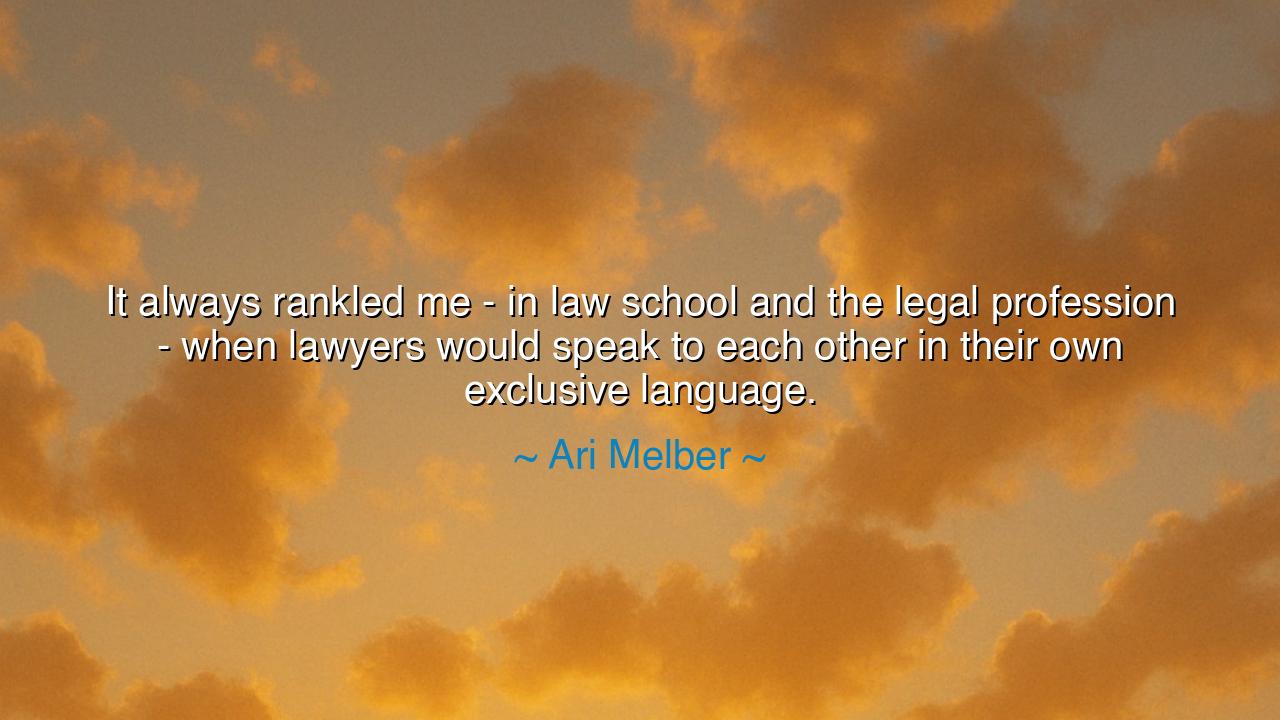
It always rankled me - in law school and the legal profession -
It always rankled me - in law school and the legal profession - when lawyers would speak to each other in their own exclusive language.






“It always rankled me — in law school and the legal profession — when lawyers would speak to each other in their own exclusive language.” Thus declared Ari Melber, a man who gazed upon the walls of his own discipline and saw, not wisdom, but separation. In his words lies both rebuke and yearning — the rebuke of arrogance that hides behind words, and the yearning for a language that unites rather than divides. For Melber, the law is not meant to be a tower of ivory, but a bridge of understanding. The law, at its purest, is the people’s language for justice. Yet when it becomes cloaked in exclusive language, it ceases to serve the people and begins to serve only itself.
In ancient times, the sages knew that words were sacred vessels — tools by which truth could pass from one soul to another. When speech becomes a wall rather than a window, wisdom withers. Thus, Melber’s frustration — that lawyers, entrusted with the voice of justice, would turn it into an echo chamber of pride. The exclusive language of the legal world was meant to clarify truth, but too often, it obscures it. What good is the law, if those who need it most cannot understand it? What good is a truth, if it must be translated through a thousand tongues before it reaches the heart?
The story of this division is as old as civilization. In the ancient Tower of Babel, men sought to reach the heavens, but their unity was shattered by confusion of tongues. The builders could no longer understand one another, and their great tower fell. So too does any profession crumble when it speaks a language the world cannot share. The law, once a force for order, becomes instead a monument to its own complexity. The lawyer and the citizen stand apart — one speaking in Latin phrases and statutes, the other lost in translation.
But there have always been those who sought to break this spell. Consider Abraham Lincoln, who, though trained in law, spoke in the tongue of the common man. His speeches, filled with plain words and deep truth, stirred the hearts of millions. He did not hide behind legal jargon, but revealed justice in the language of life. Lincoln, like Melber, understood that clarity is not the enemy of intelligence, but its highest form. To speak simply is not to speak shallowly — it is to speak with power.
Melber’s words challenge us to look within our own vocations. Each craft, each discipline, has its own secret dialect — engineers, doctors, scholars, all build walls of words. Yet the wise man knows: a secret language may guard the mind, but it imprisons the heart. If knowledge cannot be shared, it becomes sterile; if truth cannot be spoken simply, it loses its strength. The greatest teachers are not those who dazzle with complexity, but those who illuminate with simplicity.
This quote, then, is more than a complaint — it is a call to humility. It reminds us that knowledge is not a weapon to distinguish the few from the many, but a gift meant to serve all. The true scholar does not hide behind words; he makes words serve the listener. To communicate clearly is an act of compassion, for it honors the dignity of every mind. To use exclusive language for vanity is to betray the very purpose of learning — to enlighten.
The lesson is timeless: Speak so that others may understand, not so that they may admire. Let your words be tools of connection, not symbols of superiority. Whatever your field — be it law, science, or art — remember that your wisdom is not complete until it can be shared. As the ancients said, “The highest knowledge is that which can be spoken to a child.”
So, O listener, take heed: do not build Babels with your words. Let your speech be bridges, not barriers. Be like Melber — one who remembers that language, when wielded with humility, is the purest form of justice. For when all can understand, all can rise; and when truth is spoken plainly, it becomes not the property of the learned, but the light of mankind.






AAdministratorAdministrator
Welcome, honored guests. Please leave a comment, we will respond soon